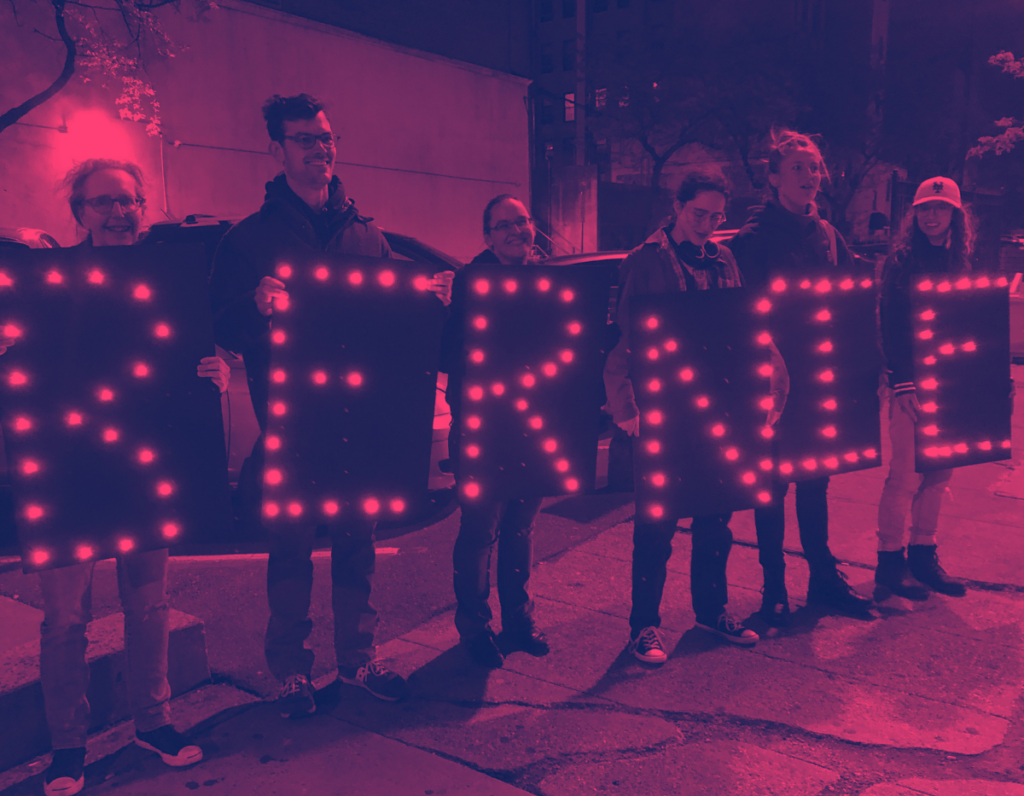I’m very glad to see Max Elbaum speak up in support of DSA’s alliance with Jamaal Bowman. I’m a member of Lower Hudson Valley DSA, Bowman’s home chapter, and I’ve seen firsthand how he combines a radical political message with effective campaigning. DSA needs to embrace Bowman, not push him away.
Elbaum gets a lot right: the need for on-the-ground organizing in my district and others to build up support for the BDS movement, the damage this strife has done to our relationship with the Squad, and the danger of the toxic “rule or ruin” politics embraced by Bowman’s opponents.
But I think Elbaum gives too much credit to the forces in DSA who want an immediate break with the Democrats. They were not the majority of the anti-Bowman coalition, and their overall influence is weak.
What is remarkable is that DSA has managed to develop a majority consensus about electoral politics. Although they did not set out to force an immediate break with the Dems, the anti-Bowman forces now threaten our relationship with the Squad.
An unlikely alliance
Trotskyists around the Tempest Collective and Socialist Alternative’s entryist formation were certainly one loud component of the informal coalition to expel Bowman. But they were never the majority. Both of these groups are far too small and outside the DSA mainstream to have any representation on DSA’s National Political Committee, and they did not extend their influence in DSA through this campaign.
The three members of the Bread and Roses caucus on the NPC were split on this issue, as was the caucus itself. B&R is not a Trotskyist caucus, but it does include some former members of Solidarity and the ISO. Those of us who come out of the Trotskyist movement (like myself) were also split on this issue.
A much stronger component of this alliance was an informal grouping of DSA members who were former members of the Collective Power Network or members of the several small-c “communist” caucuses of DSA. By my count, there are three members of the NPC who represent this milieu, and who fought strongly to expel Bowman (one of these members has since resigned from the NPC). This group is also strongly represented in the leadership of DSA’s International Committee.
While the politics of this informal group are really hard to characterize, they do not oppose work inside the Democratic Party. In fact, they are critical of the “dirty break” electoral strategy advocated by Bread and Roses and others (more on this below).
These groups draw inspiration from a diverse range of sources—Chavismo, Cuban socialism, Maoism, Thomas Sankara, and more. From these sources, they have often drawn ultra-left conclusions (even when the original practitioners they draw from do not).
I believe this group did far more to win over rank-and-file DSA members to their cause. This was certainly the case in my chapter, where the three members of B&R were split, with two of us strongly supporting Bowman, and the leadership of the anti-Bowman side coming from comrades close to the former CPN trend (I have since resigned from B&R over its failure to develop a unified or effective response to the attack on Bowman).
Once it became clear that expelling Bowman would mean splitting with the Squad, I saw unaffiliated members who originally supported expelling Bowman re-evaluate their position: some dug in, but others shifted.
DSA’s electoral consensus
I think Elbaum over-sharpens the current debate in DSA over electoral politics. In a major shift forward from the old debates over whether or not to participate in the Democratic Party, DSA members have actually achieved a remarkable and productive consensus about electoral work.
Besides a few tiny caucuses with loud voices, the debate over whether or not to work in the Democratic Party for the foreseeable future is practically settled.
There are a range of opinions about how much we should work in coalition with other forces in the Democratic Party, and whether we should ever hold our noses to vote for candidates like Joe Biden (most of us did).
But there is broad consensus in DSA that our primary goal right now is to build up a distinct democratic socialist political current within the Democratic Party. And we all largely agree that the way to build this distinct political current is to target the worst elements of the Democratic Party in primary elections.
This approach is more confrontational than the traditional approach of “progressive” work inside the Democratic Party, and even though we work in alliance with Bernie and the Squad, our approach is different from theirs.
Yes, many of us do want a “dirty break” with the Wall Street wing of the Democratic Party—we think that in the long run, our work to build up our own independent electoral apparatus in the Democratic Party will force the party to split. But most of us do not see this goal as an immediate tactical priority, and we are agnostic about how that break will come about.
This perspective does not prevent us from working in coalition with others who share a perspective closer to DSA’s original realignment perspective. Our combined work has already done so much both to win over millions of people to democratic socialist ideas and to sharpen the conflict with Wall Street Dems.
Punish toxic behavior
I agree with Elbaum that DSA’s national leadership could have done a better job educating members about the need to discipline the BDS Working Group. However, I think the NPC was correct to de-charter the BDS Working Group and suspend its leaders.
For too long, DSA’s leadership has tolerated a situation where national working groups, with self-selected leadership, effectively set DSA policy on issues. This problem reached an absurd point when the BDS Working Group, an unelected, unaccountable body, called to expel another DSA member.
We now know that before Bowman ever took his vote on Iron Dome, the BDS Working Group decided on its own to launch a campaign targeting elected members of DSA to change their position on BDS—and Bowman was their first target. In a democratic organization, the decision to run a campaign targeting an elected leader should not be made by an unelected volunteer body.
After the Iron Dome vote and Bowman’s trip to Israel, the NPC attempted to work with the working group to coordinate a response, but the working group kept raising the stakes and altering the demands given to Bowman. Even after Bowman withdrew his sponsorship for the Israel Relations Normalization Act, a key DSA demand, the BDS Working Group launched a Twitter thread arguing this was not good enough.
Once the NPC voted not to expel Bowman, that should have settled the issue for official DSA bodies. Instead, the BDS Working Group continued to use the resources of the organization to launch a public fight to reverse the decision.
Activists in our chapter fought hard to endorse Bowman in his first election because he is an effective fighter for our ideas. This toxic debate would have pushed most people away. Instead, Bowman has maintained his DSA membership and maintained his relationship with our local and national leadership. He has demonstrated a powerful patience and willingness to change his mind.
We are not always going to be so lucky. We certainly need to leave room for debate and discussion, but the NPC was right to punish the repeated bad behavior of the BDS Working Group after all other means of working with them failed. And it set a bad precedent to walk back that discipline after it was issued.
Featured image: “Bernie Light Brigade” in Yonkers, NY: Members of Lower Hudson Valley DSA—Rep. Jamaal Bowman’s home chapter—flash their support of Sen. Sanders’ 2020 presidential campaign. Photo courtesy of Dan Lutz.
Did you enjoy this article?
We're in the middle of our annual fund drive, and this year we're building our own internal infrastructure for subscriptions, meaning more of every dollar pledged goes to fulfilling our mission. Subscribe today to support our work and be a part of Convergence's next evolution.

